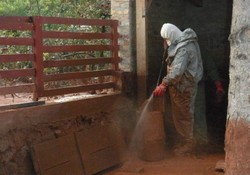Country work

WHO/Roger Aertgeerts
WHO/Europe encourages Member States to identify priorities in the area of chemical safety based on national assessments of exposure and risk. To facilitate action in priority areas, WHO/Europe provides technical support and assists countries in:
- capacity-building;
- policy development;
- improvement of information collection and sharing;
- strengthening preparedness and response to chemical emergencies through joint project implementation;
- biannual collaborative agreements; and
- ad hoc meetings, training and missions.
WHO also assists Member States with strengthening capacity for risk assessment, communication and management, knowledge collection and dissemination, and fosters health-sector awareness on important chemical safety issues.
Strengthening countries’ capacity improves their ability to tackle health priorities within international agreements such as the International Health Regulations (IHR) (2005), the Strategic Approach to International Chemicals Management (SAICM) and the implementation of commitments from the Ostrava Declaration, as well as other relevant international agreements.



